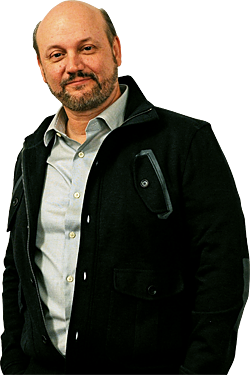
Juan Jos├® Campanella is one of ArgentinaÔÇÖs biggest directors, but most American moviegoers had probably never heard of him until his film The Secret in Their Eyes, which opened on Friday, scored an upset victory for Best Foreign Language Film at the Oscars last month (CampanellaÔÇÖs 2001 film, The Son of the Bride, was nominated in the same category). The director has split his career between Argentina and the U.S. for the past decade, directing episodes of shows as diverse as House, Law & Order: Special Victims Unit, and Strangers With Candy, while also making acclaimed films like Same Love, Same Rain and Moon of Avalleneda. Campanella sat down with Vulture to talk about his work and about the surprise of winning the Oscar.
Did you have any sense that you might win the Oscar this year?
The last few days, people started talking about it in blogs and stuff like that. I saw something in Entertainment Weekly even. It made me very nervous. When we first got nominated, we thought, Oh, itÔÇÖs a great honor to be nominated, letÔÇÖs go there and enjoy ourselves. ItÔÇÖll be like Son of the Bride, itÔÇÖs good for the movie, and thatÔÇÖs it. And then the last week or so, I saw these things and I thought, Oh, shit. Because now I was getting my hopes up and suddenly becoming nervous. So, we went in thinking that we were in the running.
Having seen most of your films now, it seems to me that memory is a big theme for you.
Yes. In this case, I was attracted to the novel first. But this interest comes out. I like the process of looking back to what we were, what we wanted, what we got, what dreams we fulfilled, what dreams we abandoned or lost. IÔÇÖm fascinated by this. IÔÇÖm always looking back, I think because I had a great childhood growing up in suburban Buenos Aires, with great parents, great siblings.
You must have really felt its loss when Argentina slid into political and social chaos.
This is a theme in Argentine culture. When democracy finally came back, all this new information came out about what happened during the dictatorship. We learned afterwards that it was like the middle ages. And it happened a block away from our house! It was a big awakening. At the same time, though, I think people are a little fed up of looking back at the dictatorship now. At a certain point, we said, ÔÇ£Enough. IÔÇÖve heard about it. IÔÇÖve made my conclusions. ItÔÇÖll never happen again, but donÔÇÖt show me any more torture.ÔÇØ Therapeutically, as a society, we stopped talking about it. And, of course, it comes back. And you see or hear something and you realize just how horrific it was, all over again.
Did that pose a problem when making this film? Were you worried that people would see it as just another history lesson?
In this movie, we tried to focus on the period before the dictatorship. I thought it was more relevant, because of what people were going through with the Bush administration. All through history, when people are afraid, fascists play the fear card to take away more of your liberties. So they enlarge fears and provoke them. People have always chosen security over liberty. So I thought it was more relevant to both Argentine and American audiences to show these things as they were beginning to happen, in a democratic society.
Were you gearing the film towards an international audience? ThatÔÇÖs interesting, because IÔÇÖm not sure a foreign audience would have a handle on the historical events in the background of the film.
But people under 30 in Argentina donÔÇÖt know anything about what happened in 1974, either. And theyÔÇÖre the ones who go to movies, so we always had those people in mind, as well as people in the rest of the world. I asked, ÔÇ£What is the most that we need to say in order to understand whatÔÇÖs happening?ÔÇØ Because if we say too much more, it becomes a history lesson, and I didnÔÇÖt want that. I figure if people are curious to learn more about this period, thereÔÇÖs always Wikipedia.
You also have a pretty active television career in the U.S. Do you think that directing episodes of shows like Law & Order: SVU influenced your approach in any way? I ask because much of this film is also in the vein of a police procedural.
That experience must have brought something. Even though the way you shoot a movie on a big, wide screen is different from the way you shoot a cop show. Some of the writers from SVU saw the film and said it was like SVU on steroids. But I think that the main difference is that the protagonists in the Law & Order world come from film noir. TheyÔÇÖre very stoic. TheyÔÇÖre very professional. Here, the characters are completely different ÔÇö theyÔÇÖre bumbling; theyÔÇÖre wounded; they donÔÇÖt know exactly what to do.
Can you compare working in the two different industries? I imagine you have more freedom in Argentina.
I have much more freedom in Argentina, obviously. Total creative freedom, but not financial freedom. ItÔÇÖs not just because of my status, but the nature of the industry. Very few films are originated by a producer. 95 percent of the cases, the director originates the job. ThereÔÇÖs no development hell for me in Argentina. Producers either want to get in or they donÔÇÖt. They donÔÇÖt start asking for changes or anything like that. And you donÔÇÖt have to deal with all these executives who think they know more than you.


